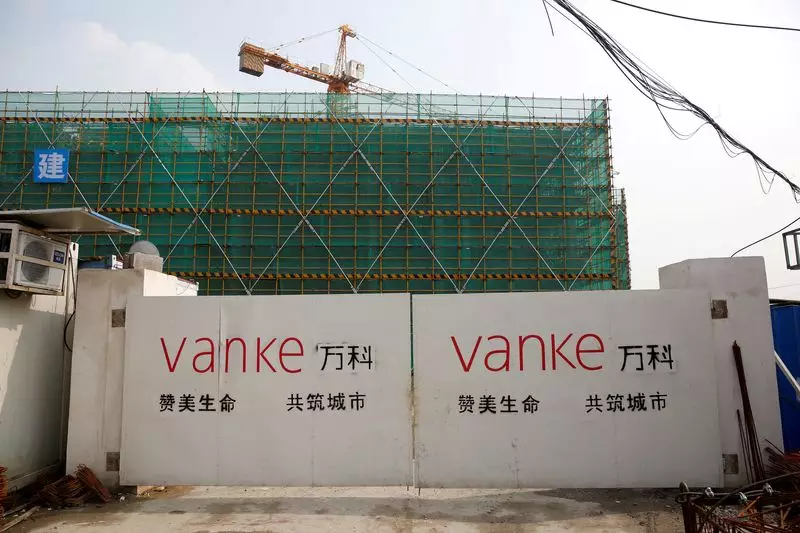The Chinese property market is facing one of its most severe liquidity crises, now extending into its fifth year. As the sector struggles, one name stands out—China Vanke, a prominent state-backed developer that has long been synonymous with stability in the otherwise tumultuous real estate landscape. The gravity of Vanke’s situation underscores the broader economic challenges that have beset the country, raising crucial questions about government intervention and the potential ripple effects on homebuyer confidence and financial systems.
Recent reports have triggered alarm bells for China Vanke. A state media article, quickly retracted, suggested that the CEO of Vanke had been detained, raising fears of a takeover or reorganization of the company. This startling news came on the heels of a slew of downgrades by leading global rating agencies, which now classify Vanke’s bonds as junk. With over $3.4 billion in debt due this year and a pressing repayment schedule culminating in a January deadline, Vanke is in an increasingly precarious position.
Vanke’s financial difficulties have raised eyebrows among analysts, particularly as the company grapples with dwindling sales and eroded financial flexibility. As of last June, Vanke’s interest-bearing debt reached a staggering 331.3 billion yuan ($45.21 billion), amplifying fears of insolvency and potential default, which could have catastrophic implications for the broader property sector.
Amidst these troubling developments, the local government in Shenzhen, where Vanke is headquartered, is reportedly taking action. Authorities have ramped up discussions with state enterprises about managing Vanke’s mounting debt and potential asset sales. The proactive measures indicate a recognition of Vanke’s strategic importance to the economy. While the government has traditionally shied away from bailing out troubled developers to avoid fostering moral hazard, the status of Vanke presents a unique dilemma.
The iconic status of Vanke in the Chinese property market cannot be overstated; its default could undermine the fragile stabilizing efforts seen in recent months. Analysts express concern that if Vanke were to succumb to its financial challenges, the repercussions would extend beyond the immediate stakeholders to the broader banking sector and public confidence among homebuyers.
The specter of China Evergrande looms large in discussions about Vanke. Evergrande, once the world’s most indebted developer, was placed into liquidation following its financial collapse, inciting widespread turmoil across the sector. Observers note that a government rescue for Vanke could take cues from Evergrande’s mismanagement. The Guangdong provincial government established risk management protocols to control the fallout from Evergrande’s downfall; a similar response for Vanke would likely be necessary to mitigate the risk of systemic failure.
Some analysts suggest that a full state takeover of Vanke might even be on the table, marking a historic move in response to the property market’s protracted struggles. For Vanke to remain viable, substantial new liquidity would be required, yet experts remain skeptical about the likelihood of a traditional capital injection.
For many, the stakes are higher than mere corporate profit. Homebuyers have been slowly regaining their confidence, and Vanke’s collapse could shatter this fragile trust. Recent trends indicate that banks may retreat further from extending credit to the real estate sector, further constraining liquidity for developers still striving to remain solvent. Existing homeowners, potential buyers, and financial institutions are all watching Vanke’s trajectory with bated breath.
The urgency of the situation prompts speculation about what form any government intervention might take. It could involve state-backed enterprises acquiring stakes in Vanke or underwriting debt obligations to ensure liquidity is sustained. A successful intervention at this juncture could signal a commitment from the Beijing authorities to stabilize the property market and restore confidence to homebuyers.
As the situation unfolds, it is apparent that the Chinese government faces a daunting challenge in responding to the liquidity crisis while avoiding the pitfalls of moral hazard. The predicament of Vanke highlights not just the vulnerability of individual developers but also the interconnectedness of the real estate market and the broader economy. Whether through direct intervention or alternative measures, the actions taken in the coming weeks will likely shape the future of China’s property market and its economy for years to come. The delicate balance of ensuring financial health without incentivizing reckless behavior will be pivotal in navigating the stormy waters ahead.

